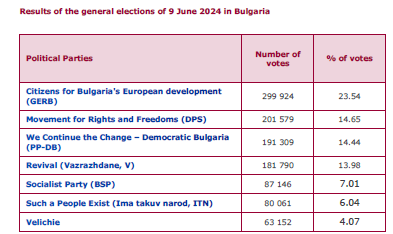Results
Elections in Europe
Corinne Deloy
-

Available versions :
EN

Corinne Deloy
Citizens for European Development of Bulgaria (GERB), led by former prime minister (2009-2013, 2014-2017, 2017-2021) Boyko Borissov, came out ahead in Bulgaria's general elections on 9 June. This was the 6th election of its kind to be held in the country since April 2021. The party won 23.54% of the vote. It came in ahead of We Continue the Change (PP), the party founded by Kiril Petkov and Asen Vassilev, which won 14.44% of the vote. The latter probably paid for having agreed to take part in the government with GERB. Indeed, following the previous general elections on 2 April 2023, the resolve to put an end to repeated elections, the country's considerable economic difficulties and the concession made by the GERB leader to accept the principle of a control mechanism for Prosecutor General Ivan Guechev, accused for several years of preventing the continuation of investigations into oligarchs subject to international sanctions, led to the signing on 22 May of an agreement between the two main parties providing for the formation of a coalition government made up of experts for a period of at least 18 months, with a 9-month rotation of the posts of Prime Minister and Deputy Prime Minister. On 6 June 2023, Nikolai Denkov (PP) was appointed head of a government of national unity. He was due to be replaced by Mariya Gabriel (GERB) in March 2024, but disagreements between the two parties over the control of certain ministries brought down the government.
After the final count, the Movement for Rights and Freedoms (DPS), representing Bulgaria's Turkish-speaking minority and chaired by Delyan Peevski and Djevdet Chakarov, won 14,65%. Revival (Vazrazhdane, V), a nationalist party led by Kostadin Kostanidov, 13.98%. Another radical right-wing party, Velichie (Grandeur or Majesty), led by Nikolay Markov, won 4,07% and entered the National Assembly (Narodno sabranie), the single chamber of Parliament.
"Bulgaria is following in the footsteps of many of its European counterparts in that far-right parties are gaining or stabilising their influence, albeit for different reasons," said Rumena Filipova, president of the Institute for Global Analytics think-tank, adding: "In Bulgaria, the pro-Russian, anti-Ukrainian Renaissance discourse is a distinctive feature, building on pro-Russian sentiments in society, shaped by Russian historical propaganda about Moscow's supposed status as Bulgaria's 'liberator/saviour'.”
“The political landscape in Bulgaria has changed significantly,” says Petar Bankov of Glasgow University, "and is characterised by increasing fragmentation, the marginalisation of the left and the rise of right-wing parties, ranging from the liberal right to the populist radical right.”
The Socialist Party (BSP), led by Korneliya Ninova, obtained 7.01% and Such a People Exist (Ima takuv narod, ITN), the populist party founded by singer and TV presenter Slavi Trifonov, 6.04%.
Turnout was extremely low, not only because of the number of parliamentary elections held in the country since April 2021, but also, according to Boriana Dimitrova, director of the opinion institute Alpha Research, because of the succession of public controversies between the country's two main parties.

source : https://results.cik.bg/europe2024/rezultati/index.html
GERB has therefore come through the country's interminable political crisis relatively unscathed. Boyko Borissov, who says he no longer wishes to be Prime minister, can rely on his image as Bulgaria's strongman, a profile favoured by half of his compatriots (49%) according to a recent opinion poll conducted by the Open Society Institute. He also presents himself as the "guarantor of stability" in a country in crisis since the major protests of summer 2020. These came in the wake of a property scandal that broke in March 2019 in which several members of the party, including the ministers of Justice, Sport, Energy and Culture, were involved.
Boyko Borissov wants to preserve the judicial status quo regarding ongoing investigations into corruption allegations, as does Delyan Peevski, a former media tycoon who faces several corruption allegations. Delyan Peevski is subject to sanctions by the United Kingdom and the United States, where he is banned from entering under the Magnitsky Act.
Former Prime Minister (2023-2024) Nikolai Denkov (PP) described DPS co-leader Delyan Peevski as "the greatest scourge facing Bulgaria". Hristo Ivanov, leader of Democratic Bulgaria (an alliance of Yes Bulgaria, the Democrats for a Strong Bulgaria and the Greens), called on his compatriots "not to leave Bulgaria in the hands of Delyan Peevski".
Following the general elections on 9 June, the question now is: Will Boyko Borissov succeed in finding a majority to govern the country? Nothing is certain, and many political analysts are predicting a new election in the autumn - which would be the 7th!
According to Daniel Smilov, Associate Professor of Political Science at St Clement of Ohrid University in Sofia and Programme Director at the Centre for Liberal Strategies, GERB and DPS could form a coalition government with a "small" party. "The coalition could guarantee a certain degree of stability, but I'm not sure what reforms, particularly those concerning corruption, it would introduce," he said.
On the same theme
To go further
Elections in Europe
Corinne Deloy
—
15 April 2025
Elections in Europe
Corinne Deloy
—
25 February 2025
Elections in Europe
Corinne Deloy
—
18 February 2025
Elections in Europe
Corinne Deloy
—
28 January 2025

The Letter
Schuman
European news of the week
Unique in its genre, with its 200,000 subscribers and its editions in 6 languages (French, English, German, Spanish, Polish and Ukrainian), it has brought to you, for 15 years, a summary of European news, more needed now than ever
Versions :



